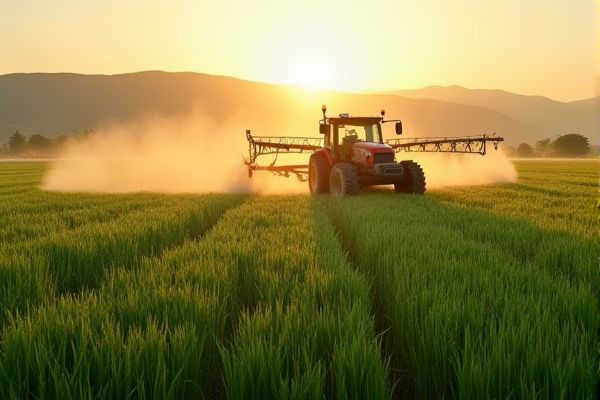
Ethiopia offers a range of irrigation job opportunities due to its diverse agricultural landscape and reliance on farming for economic growth. Positions are available in various sectors, including government agencies, non-governmental organizations (NGOs), and private enterprises focusing on water resource management and sustainable agricultural practices. Skills in project management, agronomy, and hydrology are often sought, with an emphasis on innovative solutions to combat water scarcity and improve crop yields. Networking through local universities and attending agricultural workshops can provide valuable connections and enhance job prospects in this growing field.
Job Description
Irrigation jobs in Ethiopia involve managing and improving water resources for agricultural purposes. These positions require expertise in irrigation systems, crop management, and water conservation practices. Professionals in this field work closely with farmers and local communities to enhance productivity and ensure sustainable water usage. Opportunities may include project management, field evaluations, and training programs aimed at optimizing irrigation techniques to support Ethiopia's agricultural development.
Requirement
Irrigation jobs in Ethiopia often require a background in agricultural engineering, environmental science, or agronomy, emphasizing technical knowledge in water resource management. Employers look for candidates with experience in designing and implementing irrigation systems tailored to local agricultural practices and climates. Strong problem-solving skills and familiarity with sustainable farming techniques are essential to adapt to Ethiopia's diverse environments. Proficiency in local languages and an understanding of community-based approaches can enhance your chances of success in these roles.
Salary and Perks Expected
Irrigation jobs in Ethiopia often offer competitive salaries, typically ranging from $1,000 to $3,500 per month, depending on experience and specific roles. Many positions include additional perks such as housing allowances, transportation support, and health insurance, making them more attractive. Opportunities exist within both government and private sector organizations, focusing on sustainable agricultural practices, which are increasingly vital for the country's economy. By engaging in these roles, you can contribute to improving food security and water resource management in Ethiopia.
Similar Job Names
- Irrigation Engineer
- Water Resources Manager
- Agricultural Engineer
- Irrigation Technician
- Hydrologist
- Project Coordinator
- Agronomist
- Water Quality Specialist
- Field Supervisor
- Irrigation Consultant
- Research Scientist
- Drainage Engineer
- Irrigation Planner
- Soil Conservationist
- Irrigation System Operator
Job Expectation Concept
Irrigation jobs in Ethiopia play a crucial role in enhancing agricultural productivity and food security. The country relies heavily on its diverse climates and topographies, making effective irrigation systems essential for sustaining crops throughout the year. Opportunities in this sector often include positions related to the design, implementation, and management of irrigation projects, aimed at optimizing water usage in agriculture. Engaging in these roles can significantly impact local communities by improving harvest yields and ensuring sustainable water resources.
Career Advantage and Weakness
Irrigation jobs in Ethiopia offer significant career advantages, including the opportunity to engage in essential agricultural practices that enhance food security in a country where farming is vital. The role allows you to contribute to sustainable development initiatives and improve water management systems, which are crucial for maximizing crop yields. However, challenges such as inconsistent funding, equipment shortages, and the impact of climate change may affect job stability and growth potential within the sector. Understanding these dynamics can help you make informed decisions about pursuing opportunities in irrigation and agricultural development in Ethiopia.
Important Thing Must Know
Irrigation jobs in Ethiopia play a crucial role in enhancing agricultural productivity and ensuring food security. The country relies heavily on its farming sector, with over 70% of the population engaged in agriculture, making efficient water management essential. Various organizations and government initiatives are currently working to improve irrigation systems, promoting modern techniques like drip and sprinkler irrigation. Knowledge of local water resource management and agricultural practices can significantly enhance your effectiveness in these roles. Opportunities in this field are growing, providing a chance to contribute positively to Ethiopia's economy and community well-being.
Alternative Career Options
Irrigation jobs in Ethiopia extend beyond traditional agricultural roles, opening opportunities in environmental consultancy and water resource management. You can explore roles in project management, where coordinating irrigation projects and ensuring sustainable practices is essential. Technical positions in designing and maintaining irrigation systems are also available, leveraging advancements in technology. Engaging in teaching or training in agricultural techniques can further support the development of agricultural practices in local communities.
Companies List
- Ethiopian Agricultural Transformation Agency
- Ethiopian Irrigation Development Commission
- Oxfam Ethiopia
- Syngenta Ethiopia
- Ethiopian Seeds and Agricultural Technologies (ESAT)
- TechnoServe Ethiopia
- World Food Programme (WFP) Ethiopia
- Food and Agriculture Organization (FAO) of the United Nations
- International Water Management Institute (IWMI)
- Ministry of Agriculture, Ethiopia
List of Ideal City
Ethiopia offers several cities that are ideal for irrigation jobs, each with unique agricultural landscapes and opportunities. Addis Ababa, as the capital, serves as a central hub for various irrigation projects and agricultural research. Hawassa, known for its rich agricultural surroundings and lakes, provides vibrant prospects in irrigation and water resource management. Mekelle, located in the northern highlands, emphasizes irrigation initiatives to enhance crop production in arid settings.
 jobs-ethiopia.com
jobs-ethiopia.com